Abstract
In the context of patient consent, "disclosure" refers to the provision of relevant information by the clinician and its comprehension by the patient. Both elements are necessary for valid consent. Disclosure should inform the patient adequately about the treatment and its expected effects, relevant alternative options and their benefits and risks, and the consequences of declining or delaying treatment. The clinician's goal is to disclose information that a reasonable person in the patient's position would need in order to make an informed decision. Therefore, clinicians may need to consider how the proposed treatment (and other options) might affect the patient's employment, finances, family life and other personal concerns. Clinicians may also need to be sensitive to cultural and religious beliefs that can affect disclosure.
Full text
PDF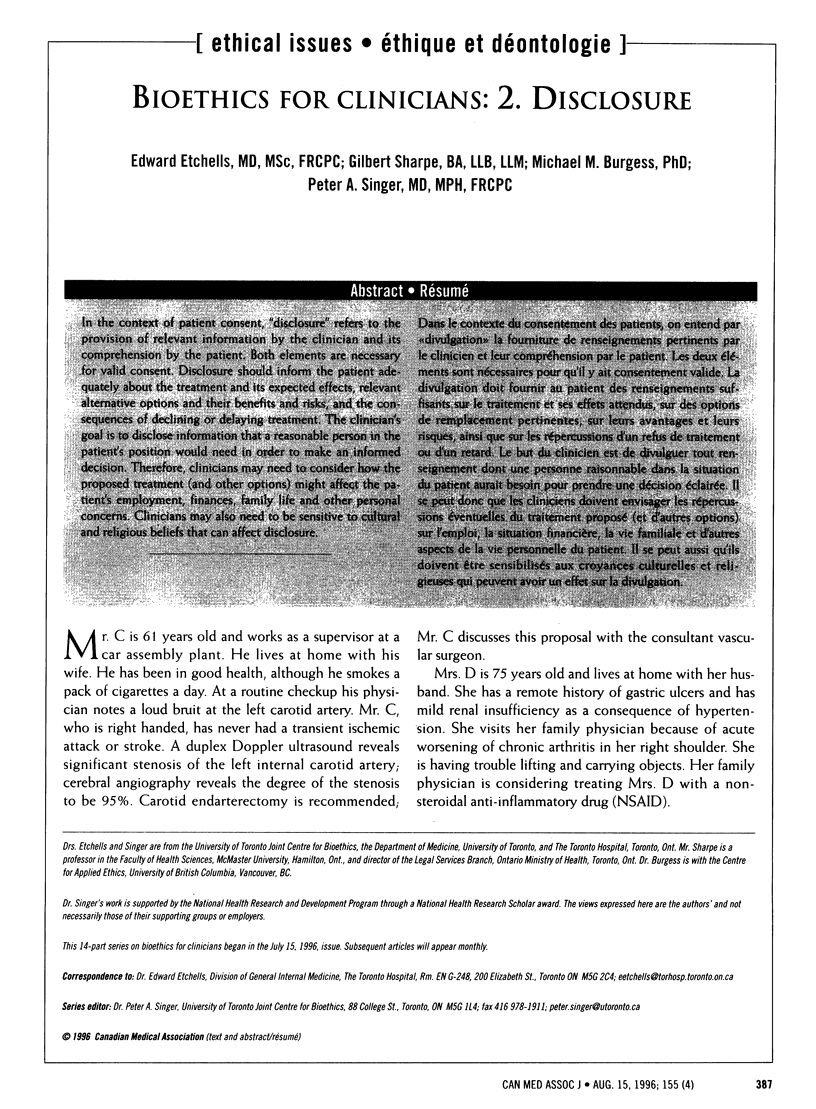
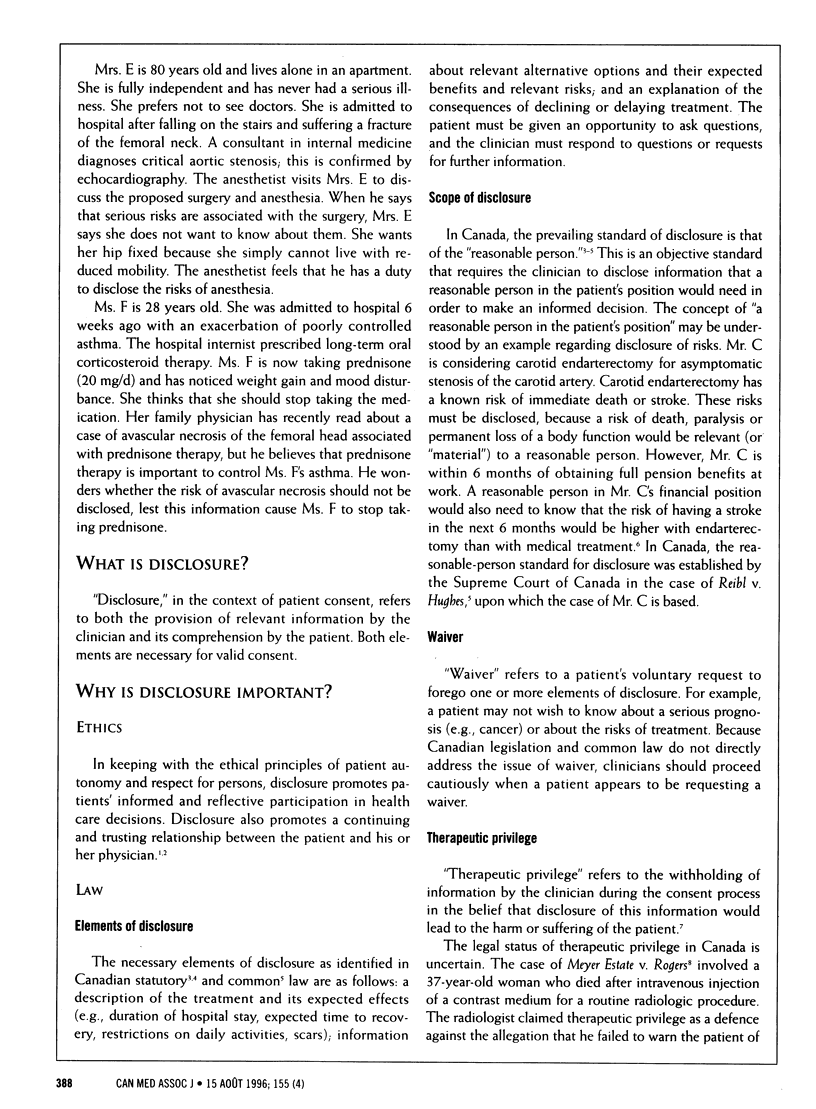
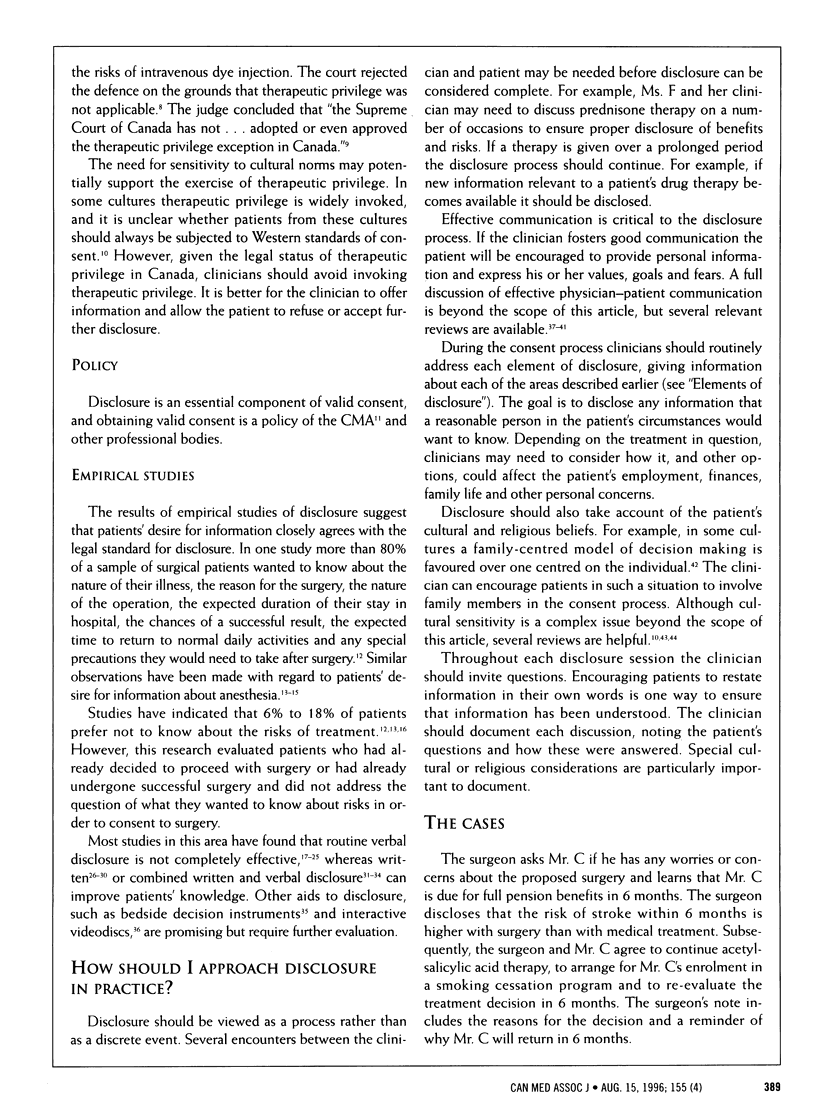
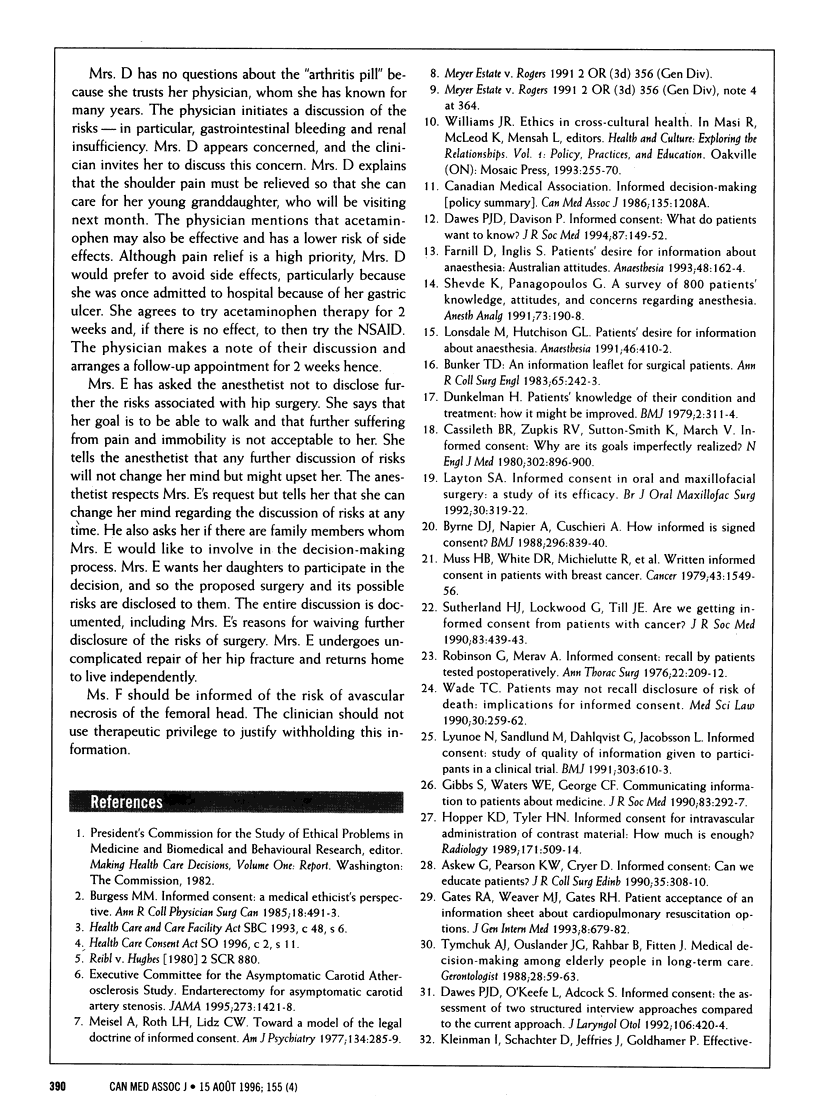
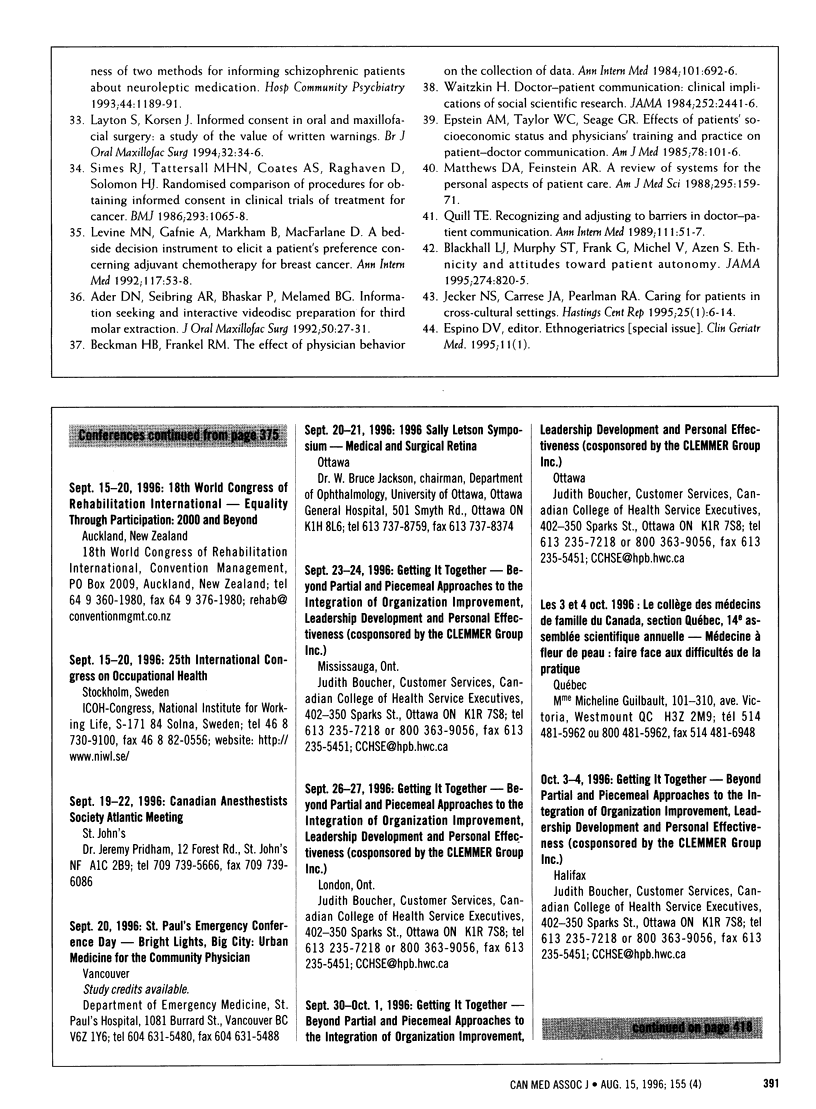
Selected References
These references are in PubMed. This may not be the complete list of references from this article.
- Askew G., Pearson K. W., Cryer D. Informed consent: can we educate patients? J R Coll Surg Edinb. 1990 Oct;35(5):308–310. [PubMed] [Google Scholar]
- Beckman H. B., Frankel R. M. The effect of physician behavior on the collection of data. Ann Intern Med. 1984 Nov;101(5):692–696. doi: 10.7326/0003-4819-101-5-692. [DOI] [PubMed] [Google Scholar]
- Bunker T. D. An information leaflet for surgical patients. Ann R Coll Surg Engl. 1983 Jul;65(4):242–243. [PMC free article] [PubMed] [Google Scholar]
- Byrne D. J., Napier A., Cuschieri A. How informed is signed consent? Br Med J (Clin Res Ed) 1988 Mar 19;296(6625):839–840. doi: 10.1136/bmj.296.6625.839. [DOI] [PMC free article] [PubMed] [Google Scholar]
- Canadian Medical Association Informed decision making: CMA policy summary. CMAJ. 1986 Nov 15;135(10):1208A–1208B. [PMC free article] [PubMed] [Google Scholar]
- Cassileth B. R., Zupkis R. V., Sutton-Smith K., March V. Informed consent -- why are its goals imperfectly realized? N Engl J Med. 1980 Apr 17;302(16):896–900. doi: 10.1056/NEJM198004173021605. [DOI] [PubMed] [Google Scholar]
- Dawes P. J., Davison P. Informed consent: what do patients want to know? J R Soc Med. 1994 Mar;87(3):149–152. doi: 10.1177/014107689408700312. [DOI] [PMC free article] [PubMed] [Google Scholar]
- Dawes P. J., O'Keefe L., Adcock S. Informed consent: the assessment of two structured interview approaches compared to the current approach. J Laryngol Otol. 1992 May;106(5):420–424. doi: 10.1017/s0022215100119711. [DOI] [PubMed] [Google Scholar]
- Dunkelman H. Patients' knowledge of their condition and treatment: how it might be improved. Br Med J. 1979 Aug 4;2(6185):311–314. doi: 10.1136/bmj.2.6185.311. [DOI] [PMC free article] [PubMed] [Google Scholar]
- Gates R. A., Weaver M. J., Gates R. H. Patient acceptance of an information sheet about cardiopulmonary resuscitation options. J Gen Intern Med. 1993 Dec;8(12):679–682. doi: 10.1007/BF02598286. [DOI] [PubMed] [Google Scholar]
- Gibbs S., Waters W. E., George C. F. Prescription information leaflets: a national survey. J R Soc Med. 1990 May;83(5):292–297. doi: 10.1177/014107689008300505. [DOI] [PMC free article] [PubMed] [Google Scholar]
- Hopper K. D., Tyler H. N., Jr Informed consent for intravascular administration of contrast material: how much is enough? Radiology. 1989 May;171(2):509–514. doi: 10.1148/radiology.171.2.2704817. [DOI] [PubMed] [Google Scholar]
- Layton S. A. Informed consent in oral and maxillofacial surgery: a study of its efficacy. Br J Oral Maxillofac Surg. 1992 Oct;30(5):319–322. doi: 10.1016/0266-4356(92)90182-i. [DOI] [PubMed] [Google Scholar]
- Layton S., Korsen J. Informed consent in oral and maxillofacial surgery: a study of the value of written warnings. Br J Oral Maxillofac Surg. 1994 Feb;32(1):34–36. doi: 10.1016/0266-4356(94)90170-8. [DOI] [PubMed] [Google Scholar]
- Lonsdale M., Hutchison G. L. Patients' desire for information about anaesthesia. Scottish and Canadian attitudes. Anaesthesia. 1991 May;46(5):410–412. doi: 10.1111/j.1365-2044.1991.tb09560.x. [DOI] [PubMed] [Google Scholar]
- Lynöe N., Sandlund M., Dahlqvist G., Jacobsson L. Informed consent: study of quality of information given to participants in a clinical trial. BMJ. 1991 Sep 14;303(6803):610–613. doi: 10.1136/bmj.303.6803.610. [DOI] [PMC free article] [PubMed] [Google Scholar]
- Matthews D. A., Feinstein A. R. A review of systems for the personal aspects of patient care. Am J Med Sci. 1988 Mar;295(3):159–171. doi: 10.1097/00000441-198803000-00001. [DOI] [PubMed] [Google Scholar]
- Meisel A., Roth L. H., Lidz C. W. Toward a model of the legal doctrine of informed consent. Am J Psychiatry. 1977 Mar;134(3):285–289. doi: 10.1176/ajp.134.3.285. [DOI] [PubMed] [Google Scholar]
- Muss H. B., White D. R., Michielutte R., Richards F., 2nd, Cooper M. R., Williams S., Stuart J. J., Spurr C. L. Written informed consent in patients with breast cancer. Cancer. 1979 Apr;43(4):1549–1556. doi: 10.1002/1097-0142(197904)43:4<1549::aid-cncr2820430449>3.0.co;2-r. [DOI] [PubMed] [Google Scholar]
- Quill T. E. Recognizing and adjusting to barriers in doctor-patient communication. Ann Intern Med. 1989 Jul 1;111(1):51–57. doi: 10.7326/0003-4819-111-1-51. [DOI] [PubMed] [Google Scholar]
- Robinson G., Merav A. Informed consent: recall by patients tested postoperatively. Ann Thorac Surg. 1976 Sep;22(3):209–212. doi: 10.1016/s0003-4975(10)64904-1. [DOI] [PubMed] [Google Scholar]
- Simes R. J., Tattersall M. H., Coates A. S., Raghavan D., Solomon H. J., Smartt H. Randomised comparison of procedures for obtaining informed consent in clinical trials of treatment for cancer. Br Med J (Clin Res Ed) 1986 Oct 25;293(6554):1065–1068. doi: 10.1136/bmj.293.6554.1065. [DOI] [PMC free article] [PubMed] [Google Scholar]
- Sutherland H. J., Lockwood G. A., Till J. E. Are we getting informed consent from patients with cancer? J R Soc Med. 1990 Jul;83(7):439–443. doi: 10.1177/014107689008300710. [DOI] [PMC free article] [PubMed] [Google Scholar]
- Tymchuk A. J., Ouslander J. G., Rahbar B., Fitten J. Medical decision-making among elderly people in long term care. Gerontologist. 1988 Jun;28 (Suppl):59–63. doi: 10.1093/geront/28.suppl.59. [DOI] [PubMed] [Google Scholar]
- Wade T. C. Patients may not recall disclosure of risk of death: implications for informed consent. Med Sci Law. 1990 Jul;30(3):259–262. doi: 10.1177/002580249003000315. [DOI] [PubMed] [Google Scholar]
- Waitzkin H. Doctor-patient communication. Clinical implications of social scientific research. JAMA. 1984 Nov 2;252(17):2441–2446. doi: 10.1001/jama.252.17.2441. [DOI] [PubMed] [Google Scholar]
- Weinstabl C., Porges P., Plainer B., Werba A., Spiss C. K., Seitz H. Coeliac plexus block with bupivacaine reduces intestinal dysfunction in neurosurgical ICU patients. Anaesthesia. 1993 Feb;48(2):162–164. doi: 10.1111/j.1365-2044.1993.tb06860.x. [DOI] [PubMed] [Google Scholar]


